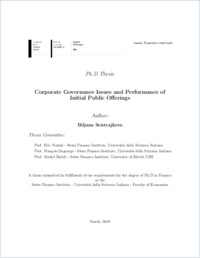Corporate governance issues and performance of initial public offerings
- Seistrajkova, Biljana
- Nowak, Eric (Degree supervisor)
- Degeorge, François (Degree committee member)
- Habib, Michel (Degree committee member)
-
12.03.2018
124 p
Thèse de doctorat: Università della Svizzera italiana, 2018
Earnings management
Initial public offerings
IPO underpricing
Equity carve-outs
Executive compensation
Stock options
IPO long-run performance
Short selling
Analysts recommendations
English
In my PhD thesis I analyze corporate governance issues of initial public offerings and their subsequent performance. In the first chapter I find that the first-day return of newly issued subsidiary stocks (equity carve-outs) is explained by the reporting distortions in the pre-IPO period, conditioned on whether the executives and directors of the subsidiary received stock options with an exercise price equal to the IPO offer price. I show that the predictive power of the accruals on future returns and its direction differ depending on the executive compensation packages, suggesting that management intentionally manipulate earnings. In the second chapter I find that carve-outs that did not grant incentive stock options subsequently underperform both relative to the overall market and relative to a sample of carve- outs that granted stock option in three-year window. My results point that incentive stock options are signaling better corporate governance to the market that result in better long-run stock market and accounting performance. The third chapter examines short sales transaction volumes on the first trading day of initial public offerings (IPOs). The tests provide evidence of informed trading immediately at the IPO. Results reveal that short selling volume on the first trading day of the IPO is significantly negatively linked to subsequent stock returns and accounting performance. Further I show that heavily-shorted IPOs have the highest probability of analyst downgrades within the first year after the IPO. Overall, the results indicate that short sellers are important contributors to efficient stock prices.
- Language
-
- English
- Classification
- Economics
- License
-
License undefined
- Identifiers
-
- RERO DOC 309456
- URN urn:nbn:ch:rero-006-117331
- ARK ark:/12658/srd1318676
- Persistent URL
- https://n2t.net/ark:/12658/srd1318676
Statistics
Document views: 329
File downloads:
- Texte intégral: 344
